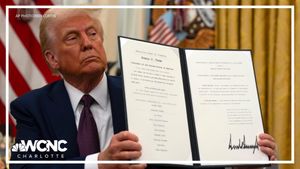Tesla, Inc. (NASDAQ: TSLA), the leading electric vehicle (EV) manufacturer, has attracted considerable attention on Wall Street after releasing its fourth-quarter delivery numbers for 2024. Despite delivering 495,570 vehicles, the results did not meet analysts' expectations, raising concerns about the company's growth potential and near-term challenges.
According to reports, Tesla's delivery figures, albeit substantial, served as the trigger for intense discussions among market analysts. The shortfall compared to forecasts has varied interpretations, with contrasting opinions about the company’s ability to achieve its ambitious goals, particularly its plans to expand its automotive operations, advance its robotaxi services, and increase its energy storage segment.
Bank of America analysts changed their outlook on Tesla, downgrading their rating from 'Buy' to 'Neutral,' though they did raise their price target from $400 to $490. They emphasized the high risks of execution but acknowledged the upside potential. On the other hand, Wedbush analyst Dan Ives remained positive, maintaining his 'outperform' rating and setting his price target at $535. Ives called the quarterly results 'respectable' and pointed out the company's involvement in artificial intelligence and autonomous driving as significant assets, especially with the political climate shifting potentially under another Trump administration.
Conversely, there are voices of caution. JPMorgan's Ryan Brinkman reiterated his 'underweight' rating with a considerably lower price target of $135. He warned of the potential damage Tesla could face, estimating losses of 40% of profits if consumer tax credits were eliminated under new regulations. Given the anticipated profits for 2024, which stand at around $8.3 billion EBIT, this situation raises alarms about Tesla’s susceptibility to regulatory changes outside its control.
Meanwhile, progress and hurdles persist with Tesla’s Full Self-Driving (FSD) system. Although the technology underwent tests demonstrating notable improvements, issues arose concerning its reliance on camera technology rather than LiDAR or radar. A recent trial showed successful autonomous driving for 15 miles without interventions; nonetheless, human-like driving behaviors and the technology's overall readiness for widespread deployment remained contentious points. Adding to Tesla's regulatory scrutiny, the National Highway Traffic Safety Administration (NHTSA) has initiated safety investigations concerning the company's autonomous features, which pose challenges for broader acceptance of self-driving capabilities.
Market reactions to Tesla's latest results have highlighted the stock’s volatility, with shares trading at $394.94, reflecting minimal gains during the day but seeing slight declines afterward. Investors are closely watching the active trading volumes, which rose slightly above averages, indicating dynamic interest amid the uncertainty surrounding Tesla’s future.
On the competitive front, Rivian has made significant strides by resolving supply chain issues affecting its production capacity for electric vehicles. Rivian's recent success enabled it to surpass revised production expectations, delivering 49,476 vehicles for the year. This development raises competitive stakes within the industry, especially as Rivian prepares to release its quarterly earnings.
The diverse spectrum of price forecasts for Tesla as reported this week highlights the uncertainty surrounding the firm’s prospects. Canaccord Genuity analysts raised their forecast from $298 to $404, indicating possible optimism. Meanwhile, Bank of America projected long-term aspirations of capturing 5% of the global automotive market for Tesla, potentially placing it among the top ten automotive manufacturers globally.
Adding complexity to Tesla's financial news is its unusual tax situation. Despite declaring $2.3 billion U.S. income for 2024, Tesla reported zero federal income tax, employing strategic maneuvers to eliminate its tax obligation. Over the past three years, it has amassed $10.8 billion in U.S. income and only paid $48 million, averaging effective tax rates at just 0.4%—substantially below the corporate tax rate of 21%.
Tesla benefited from various legal loopholes, such as accelerated depreciation and executive stock option deductions, helping it minimize its tax payments significantly. Critics have pointed out the concerning trend of large corporations employing these tactics to impose lower tax burdens on themselves than the average American taxpayer, exacerbated by laws such as the 2017 Tax Cuts and Jobs Act, which has disproportionately favored abundant corporate earnings.
This pattern of behavior has sparked outrage among advocates for tax reforms. Suggestions to establish measures such as minimum corporate tax rates and closing depreciation loopholes have gained traction as discussions continue about economic inequality and fairness within the tax system.
Despite the opposition to existing laws, Republican leaders are currently pushing for additional tax cuts for companies like Tesla. If implemented, these measures could result in substantial benefits for Tesla's financial posture, allowing the corporation to contribute even less to the federal tax revenue, thereby leaving ordinary taxpayers to bear the burden.
Tesla’s ability to navigate these challenges, particularly as competition rises and regulatory frameworks evolve, will be pivotal as it continues its quest to maintain its status at the forefront of the electric vehicle revolution. While the company has demonstrated remarkable financial agility, the impending questions about its future execution and regulatory landscapes remain topics of intense scrutiny.



